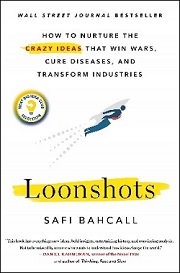What We're Reading Now
Teaching with Stories
14 May 2019
Eden read Loonshots: How to Nurture the Crazy Ideas that Win Wars, Cure Diseases, and Transform Industries, by Safi Bahcall and felt inspired by the author’s knack for storytelling.
Tags: communication, eden read, the next big idea club
This quarter, I read the Next Big Idea Club’s selection, Loonshots: How to Nurture the Crazy Ideas that Win Wars, Cure Diseases, and Transform Industries, by Safi Bahcall. Left to my own devices, I don’t think I would have chosen this book to read since the title alludes to technical breakthroughs in scientific fields that I don’t find particularly interesting. However, I found myself enjoying the opening chapter, which read more like a World War II history than a book about science. I quickly realized that in addition to being a physicist and biotech entrepreneur, Bahcall is a storyteller.
Throughout Loonshots, Bahcall tells stories in two ways. First, he tells the stories about the life of a loonshot, “a neglected project, widely dismissed, its champion written off as unhinged.” These stories are long, spanning chapters, and give you insights into the minds of inventors while painting a picture of the world around them. Second, the author tells stories to explain scientific concepts. He does a masterful job of taking the reader to the brink of where average scientific understanding might end, and then presses pause and uses a simple analogy to explain the science behind the breakthrough. The first type of story kept me engaged while reading the book, but the second type of story inspired me to think about how I could use stories to be a better teacher.

The most memorable teachers and professors I’ve had have always been the ones who teach using pictures, stories, and metaphor. A professor of mine at the University of Virginia who taught Abnormal Psychology started every class by playing an episode of the podcast, This American Life, to tie that day’s lesson to someone’s real experience. My Econometrics professor didn’t just teach the class what formulas to use when analyzing data—he told us stories about how data had been used by different organizations during major political campaigns. And while I’ve always appreciated this kind of storytelling, the kind that tells me why information is important, what I really loved about Loonshots was the effort Bahcall put into explaining the technical details of how.
My favorite example of Bahcall’s writing style comes from chapter 4 of Loonshots. Bahcall compares the polarization of a light beam to the Millennium Falcon in the opening scene of Star Wars Episode II: The Empire Strikes Back. Han Solo accidentally lands his ship in a giant space worm’s mouth and must turn the ship to a certain angle to escape the monster’s closing teeth. Light beams and polarization filters, Bahcall says, work the same way.
Whether or not teaching is a part of your daily role, I think anyone could benefit from trying to explain things to others in simpler and more creative ways. Though as I’ve tried to practice it myself, I admit it’s harder than I anticipated. Lately I’ve been thinking about the way I talk about mindfulness exercises. Usually I say, “Try this exercise. Just trust me. It might take some practice.” But I’m realizing that’s not the most thoughtful or compelling way to communicate with others. I’m going to take inspiration from Loonshots and think about how I can be more creative when I talk about my experiences so that I can paint a clearer picture of the why and the how for my audience.







Comments
Our Comment Policy:
Our blog posts are only half of the conversation. What our readers have to say is equally important to us, and we're grateful for all the comments that continue the dialog.
To ensure that the discussion here is as useful as possible to all of our readers, please be respectful of our contributors and refrain from harassing, threatening and/or vulgar language. We reserve the right to screen and remove any comments from the site. If you have a question about a comment or want to discuss our policy, please contact us. We'll talk it over.
There are no comments for this entry yet.